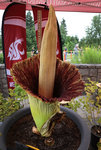


After a turbulent 17-year life, “Titan VanCoug,” Washington State University’s corpse flower, is in bloom.
“I’m excited,” Associate Professor of Molecular Biosciences Steve Sylvester said. “It’s doing what I wanted it to do which was bring people to campus.”
Sylvester planted the seed for the flower in his office at WSU Vancouver 17 years ago after receiving the seed from a titan arum located at the University of Wisconsin-Madison in 2002. According to Sylvester, in the beginning stages of owning the plant, it grew to be about 12 inches tall (just one leaf) and stopped growing and died. The natural growing process of the plant consists of growing leaves, killing them off and having the leaves grow back larger. Sometimes, instead of growing a leaf, the plant begins to bloom.
Native to the rainforests of the limestone hills of Sumatra, Indonesia the Amorphophallus titanum, is an endangered species of flower that produces some of the largest flowering structures in the world, reaching over 4 feet in height. It pollinates by attracting corpse flies and dung beetles, so the stench of the flower smells of rotting fish and moldy cheese.
On June 1, Titan Vancoug began to show signs of a bloom and by July 1, the plant had grown to 25.5 inches tall and has grown about two inches a day since. It now reaches a height of 49.5 inches, or 4.1 feet.
“I had a plan in my folder called ‘Big Smelly Plant,’” Director of Marketing and Communications for WSU Vancouver Brenda Alling said when asked how she had planned for this. She explained that when she came to the campus 10 years ago, Sylvester told her he had this plant and it was going to be a big deal, so she started to plan.
“We’re expecting five to ten thousand people over the next 24 to 48 hours,” she said.
As of this morning, the plant had a large following of people around it. A line wrapped around the flower and down part of the trail on campus to the parking lot.
“The plant is the star, I’m just the waterboy,” Sylvester said.
This morning, Sylvester cut a portion of the flower to pollinate seeds with pollen he received from the New York Botanical Gardens in an attempt to create seeds to give out for further research on the rare and endangered flower.
“I was only able to physically pollinate about 30 (seeds),” Sylvester told the crowd of people gathered to smell the plant. He later said he’s hoping to get a total of 100 seeds after the natural pollination process.
“(The goal) is to maximize the genetic diversity of the plant so it can survive better in its natural habitat,” Sylvester explained after being asked about cloning it again and later explained to the crowd that building a strong biodiversity of the plant will help it combat climate change in its natural habitat.
Sylvester plans to give the seeds he germinates to universities, public gardens and non-profits before he gives to private industries.
“So far I’ve gotten requests from one non-profit and three private individuals,” he said. “I suspect to get a lot more (requests) soon (now that it’s blooming).”
Titan Vancoug is a late bloomer as most corpse flowers tend to bloom after about 10 years of growing, dying and rebuilding. Sylvester suspects this latency to bloom is due to an over-watering of the plant that led to an explosion of the corm a few years ago. The explosion caused the plant to clone itself, resetting its lifecycle, an event Sylvester now considers a blessing instead of a curse. Because of this cloning, Sylvester expects another bloom from Titan Vancoug within the next three months and three to four over the next four years.
You can watch the plant bloom now at WSU Vancouver,14204 NE Salmon Creek Ave., Vancouver, outside the Science and Engineering building. It’s visiting hours are 8 a.m.to 9 p.m. and parking on campus in the blue lot is $4. You can also view the plant on a live stream.